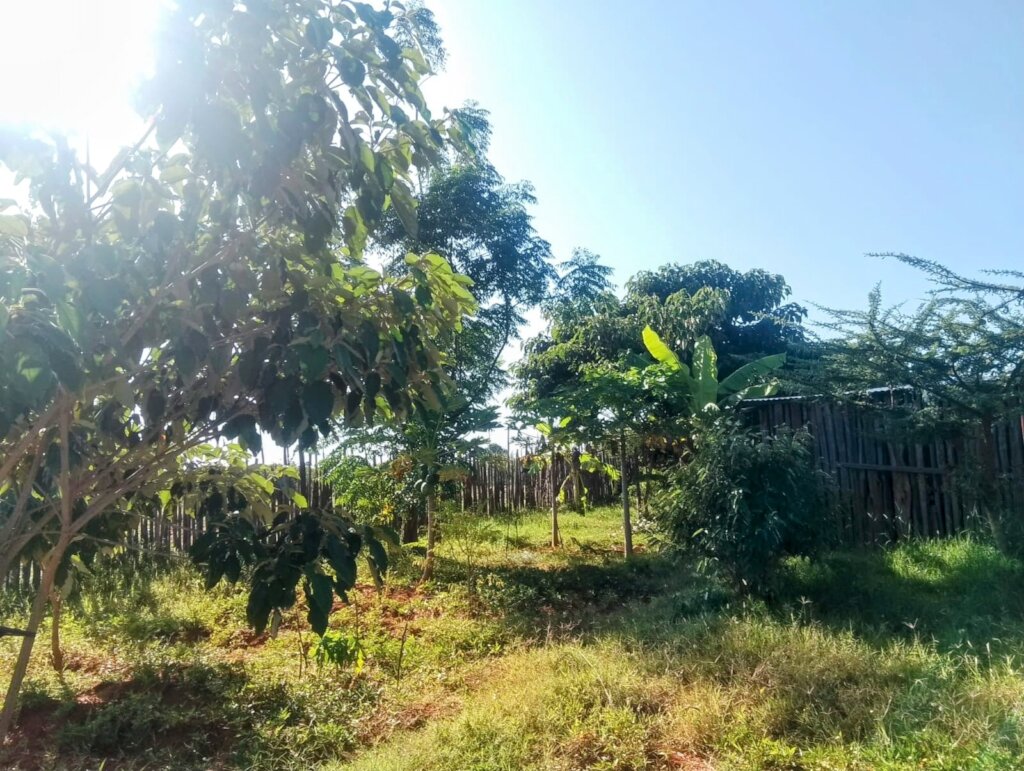By Mary McCarthy | Project Development Officer
During our day-to-day activities like planting and caring for trees and gardens, maintaining our wind and solar powered electrical system, charging the publics’ cell phones, and scouting new planting locations we do a lot of physical labour. We also have countless meaningful conversations from casual chats to formal training sessions. For this report, our long-term local volunteer, Susan, interviewed one of our phenomenal young tree planters, Samuel. We’re so happy to share their conversation with you here.
Samuel, tell me a about yourself:
I am an orphan. I live with my grandma and I study in high school. It makes me so happy that Sadhana Forest Kenya supported my family in planting a food forest around our home. They also supported us so much by delivering water; that is so hard to get in our area. When there is not enough water, I used to take my bicycle down to the river with two 20-litre jerry cans and then push it back uphill to bring water. Sadhana Forest also charges our phones and radios for free.
Can you name some of the tree species that you have planted with Sadhana Forest Kenya?
1. African Olive (Olea africana)
2. Croton (Croton megalocarpus)
3. Meru Oak (Vitex keniensis)
4. Kei Apple (Dovyalis caffra)
5. African Moringa (Moringa stenopetala)
How are you using your trees?
We use the fruit to eat or sell. Moringa leaves we cook or dry for tea. Some trees give us shade. We also use some trees for traditional medicine or to make biomass compost. We protect and care for them because they help us in so many ways.
How has the community benefited from the work of Sadhana Forest Kenya?
Sadhana Forest Kenya has helped us a lot by giving us tree seedlings, planting them with us and teaching us how to plant and care for them. They taught us about water conservation and how to use natural farming methods. Now even during droughts we get food from the trees. They also have brought people in the community together. We work as a community and share knowledge and our land is becoming greener.
Thank you Samuel and Susan for all the important work that you do for the planet.
We could not do our work without local change makers like Samuel and Susan, or the international GlobalGiving community - thank you all! If you would like to provide feedback, learn more about our projects, or if you are interested in volunteering with us, please email us at kenya@sadhanaforest.org. There is also an opportunity to leave a note at the end of this report.
Ashe Oleng! (“Thank you very much!” in Kisamburu)
By Mary McCarthy | Project Development Officer
By Mary McCarthy | Project Development Officer
Project reports on GlobalGiving are posted directly to globalgiving.org by Project Leaders as they are completed, generally every 3-4 months. To protect the integrity of these documents, GlobalGiving does not alter them; therefore you may find some language or formatting issues.
If you donate to this project or have donated to this project, you can receive an email when this project posts a report. You can also subscribe for reports without donating.
Support this important cause by creating a personalized fundraising page.
Start a Fundraiser
